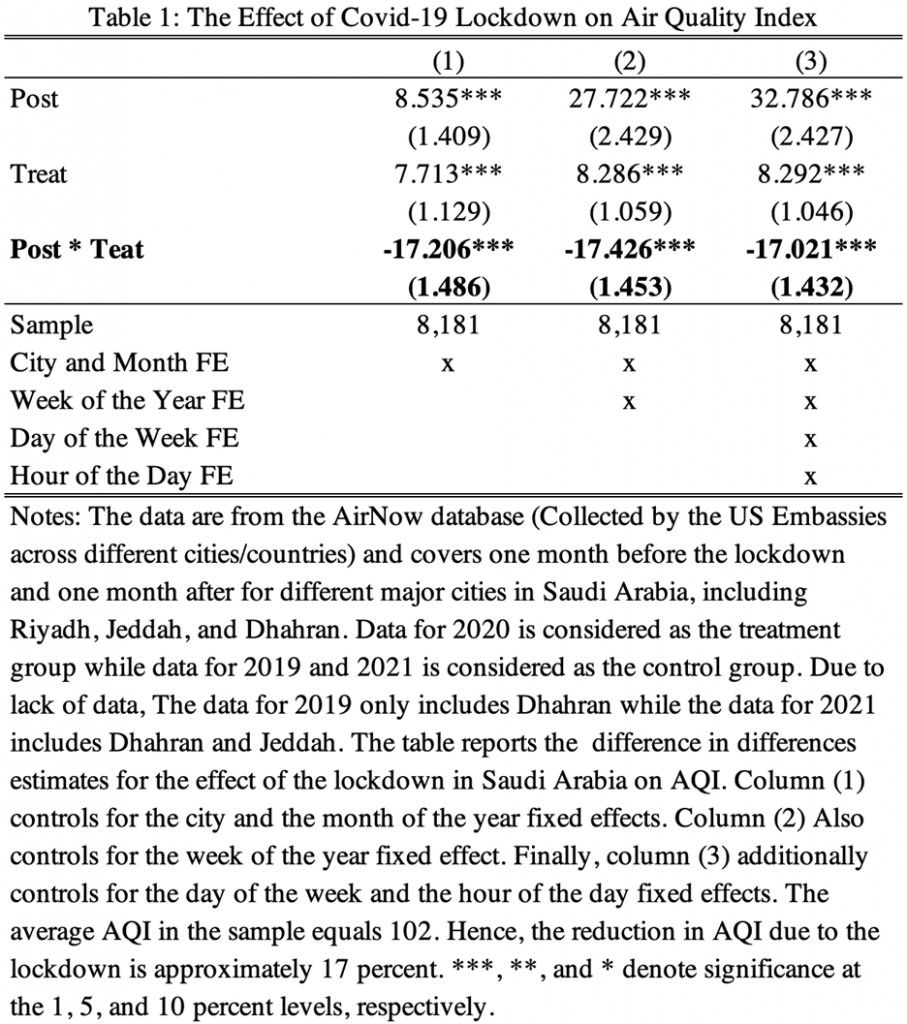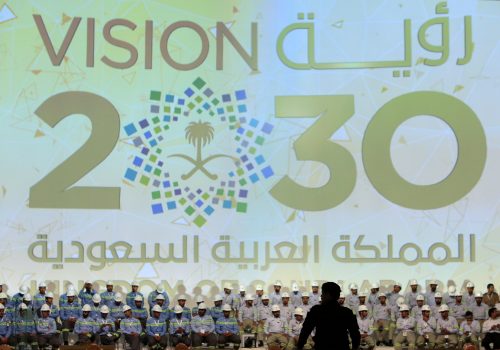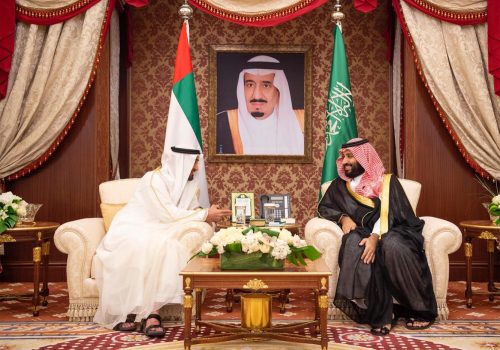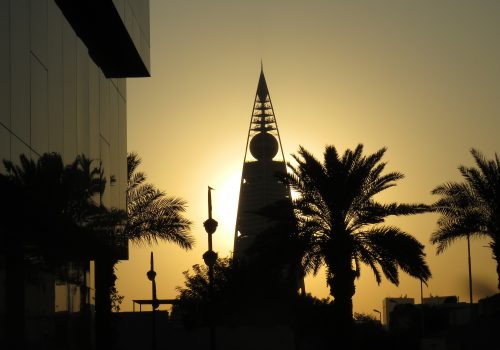COVID-19 lockdown highlights policies to reduce pollution in Saudi Arabia
At the peak of the pandemic, Saudi Arabia paid considerable attention to containing the spread of COVID-19 and implementing policies that could mitigate the looming recession. In March 2020, the Saudi government instituted a national lockdown for three months to prevent the proliferation of the virus. These extraordinary circumstances provide the perfect experiment for policymakers and researchers to investigate whether daily human activities significantly affect pollution levels in an oil-exporting country like Saudi Arabia. Understanding the environmental cost of mobility is imperative to minimize this cost as Riyadh continues to develop as part of its Vision 2030 plan.
To investigate the effect of limited mobility on the concentration of pollutants in the air of Saudi Arabia, we utilized the air quality index (AQI) from the archive of the Air Quality Monitoring Stations in the US embassies and consulates in several major cities: Riyadh, Jeddah, and Dhahran.
We used the AQI data to apply a model to estimate the lockdown effect on air quality in Saudi Arabia during April 2020, the month that followed the lockdown. Our results (Table 1) reveal a significant improvement in air quality: there was a reduction of pollutant concentration by approximately seventeen points on the AQI. This reduction represents an improvement of approximately 17 percent. Therefore, even in an oil-producing country like Saudi Arabia, human-related activities strongly affect air quality, which is surprising given the relatively high oil and gas extraction and electric power generation activities.

To put these numbers into perspective, it is helpful to examine similar analysis that looked at the lockdown’s effect on air quality across the fifty most polluted cities around the world. The results from that research found an average reduction of approximately 12 percent on the AQI across the cities studied.
Our analysis results also highlight Saudi Arabia’s automobile dependency, which is among the highest worldwide. According to Saudi Arabia’s General Directorate of Traffic database in 2019, the rate of vehicle ownership and use has been steadily increasing at an average annual rate of 5 percent. As of 2019, there were around twenty-two million licensed vehicles—80 percent of which are registered in or around the three major cities we studied: Riyadh, Jeddah, and Dharan. Saudi Arabia’s automobile dependency can be attributed to the lack of quality public transportation. Moreover, the reliance on personal vehicles is most likely the reason for the significant improvement in air quality during the lockdown, as the number of people on the road decreased dramatically within this timeframe.
Tailoring policies to produce a cleaner environment
Although air quality improved, the price of the COVID-19 lockdown on the economy was high. According to the General Authority for Statistics, in 2020, the GDP contracted by 4.1 percent and the unemployment rate increased to 7.44 percent compared to 5.7 percent in 2019. Still, limiting individuals’ carbon footprint can play a significant role in improving the environmental conditions in the country. There are several policies that should be considered that could partially mimic the lockdown effect on the environment without economic harm. These measures include reducing personal vehicle dependency and unnecessary daily commutes. The policies can be implemented by creating quality public transport options at affordable prices, encouraging remote work, and ensuring highly populated areas have venues for leisure and everyday needs within walking or biking distance.
Several recent studies have shown that public transportation results in cleaner air. For example, increasing railroads between major cities in Germany by 10 percent led to a 1 percent and 2 percent reduction in carbon monoxide and nitrogen oxide pollution, respectively. Similarly, a recent study that examined whether subway expansion improved air quality estimated a 2 percent improvement in air quality for every one standard deviation increase in subway density.
Saudi Arabia is already taking steps to bolster its public transit options. In July, the government announced that it would invest as much as $147 billion in transport and logistics over the next nine years. The plan includes a train linking the country’s eastern coast with Riyadh and Jeddah and exploring green technologies of the future like the hyperloop, an energy-efficient high-speed mass transportation system that could travel as fast as 760 miles per hour or almost ten times faster than traditional rail. This is on top of the $22 billion public transport mega-project to build a metro in Riyadh that started in 2014 and is scheduled to be completed by the end of 2021.
Additionally, promoting work from home can help reduce air pollution, as was the case in Switzerland, where working remotely was found to reduce pollution by 2.6–4.1 percent. Finally, improved air quality can be achieved by reducing nonessential individual movements by bringing essential and recreational sites closer to populated areas. This would allow people to walk or bike rather than drive to get groceries or eat out.
The lockdown that followed the COVID-19 outbreak provided a perfect opportunity to measure the effect of daily human activities on air quality. The significant reduction of pollution that we found in our research sheds light on policies that can be implemented post-pandemic to maintain the air quality improvements. These policies would have a positive short-term and long-term effect on Saudi Arabia’s environmental health. Furthermore, these shifts would help Riyadh fulfill its Paris Agreement pledge to cut annual carbon dioxide emissions by 130 million tons by 2030.
Faisal Algosair is a PhD candidate in economics at the University of Connecticut. Follow him on Twitter: @FAlgosair.
Abdulmohsen Almuhaisen is a PhD candidate in economics at the University of Connecticut.
Image: General view in Riyadh, Saudi Arabia, June 21 2020. REUTERS/Ahmed Yosri/File Photo/File Photo


